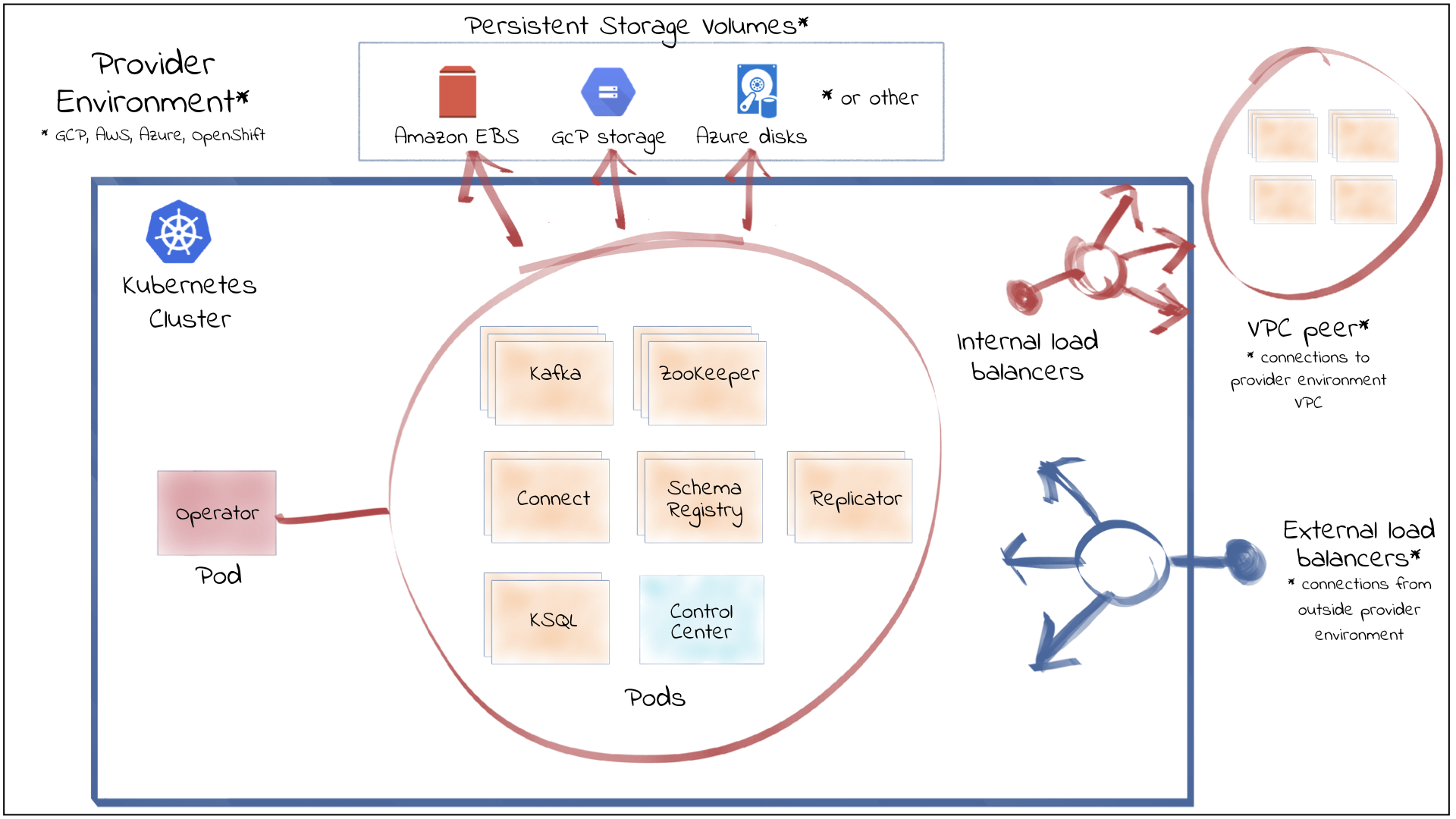Confluent for Kubernetes
Confluent for Kubernetes (CFK) is a cloud-native control plane for deploying and managing Confluent in your private cloud environment. It provides standard and simple interface to customize, deploy, and manage Confluent Platform through declarative API.
Confluent for Kubernetes runs on Kubernetes, the runtime for private cloud architectures.
Note
Confluent for Kubernetes is the next generation of Confluent Operator. For Confluent Operator 1.x documentation, see Confluent Operator 1, or use the version picker to browse to a specific version of the documentation.
See Introducing Confluent for Kubernetes for an overview.
The following video provides an introduction to Confluent for Kubernetes.
The following shows the high-level architecture of Confluent for Kubernetes and Confluent Platform in Kubernetes.

Features
The following are summaries of the main, notable features of Confluent for Kubernetes.
- Cloud Native Declarative API
Declarative Kubernetes-native API approach to configure, deploy, and manage Confluent Platform components (Apache Kafka®, Connect workers, ksqlDB, Schema Registry, Confluent Control Center (Legacy)) and resources (topics, rolebindings) through Infrastructure as Code (IaC).
Provides built-in automation for cloud-native security best practices:
Complete granular RBAC, authentication and TLS network encryption
Auto-generated certificates
Support for credential management systems, such as Hashicorp Vault, to inject sensitive configurations in memory to Confluent deployments
Provides server properties, JVM, and Log4j configuration overrides for customization of all Confluent Platform components.
- Upgrades
Provides automated rolling updates for configuration changes.
Provides automated rolling upgrades with no impact to Kafka availability.
- Scaling
Provides single command, automated scaling and reliability checks of Confluent Platform.
- Resiliency
Restores a Kafka pod with the same Kafka broker ID, configuration, and persistent storage volumes if a failure occurs.
Provides automated rack awareness to spread replicas of a partition across different racks (or zones), improving availability of Kafka brokers and limiting the risk of data loss.
- Scheduling
Supports Kubernetes labels and annotations to provide useful context to DevOps teams and ecosystem tooling.
Supports Kubernetes tolerations and pod/node affinity for efficient resource utilization and pod placement.
- Monitoring
Supports metrics aggregation using JMX/Jolokia.
Supports aggregated metrics export to Prometheus.
Licensing
You can use Confluent for Kubernetes and Confluent Control Center (Legacy) for a 30-day trial period without a license key.
After 30 days, Confluent for Kubernetes and Control Center (Legacy) require a license key. Confluent issues keys to subscribers, along with providing enterprise-level support for Confluent components and Confluent for Kubernetes.
If you are a subscriber, contact Confluent Support at support@confluent.io for more information.
See Update Confluent Platform License if you have received a key for Confluent for Kubernetes.
Documentation
A comprehensive set of documentation is available for CFK. The following are some of the documents you can start with CFK:
To quickly set up a Confluent deployment on Kubernetes, follow the steps in Confluent for Kubernetes Quickstart.
To understand how to plan your production deployment, review Plan for Confluent Platform Deployment.
To understand what is supported across versions, read Confluent for Kubernetes Release Notes.
To learn about the Kubernetes and Confluent concepts that are important for a production deployment, read through the various pages in the CFK documentation set.
To review and start using example declarative specs, see the accompanying GitHub examples repository.
To troubleshoot issues during deployment or operation, start from Troubleshoot Confluent for Kubernetes.